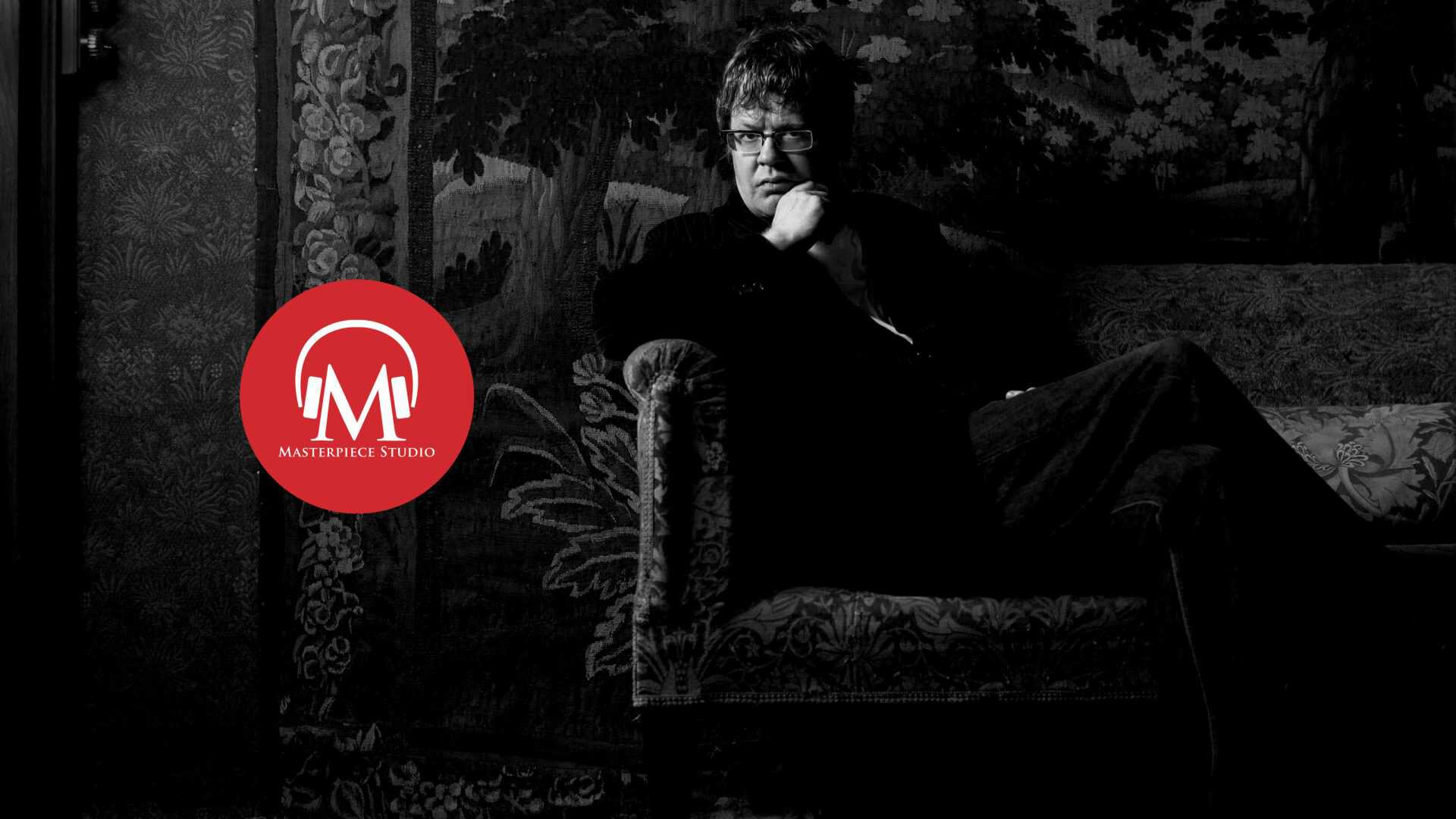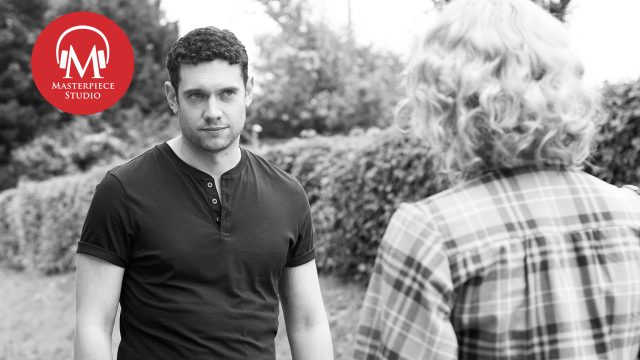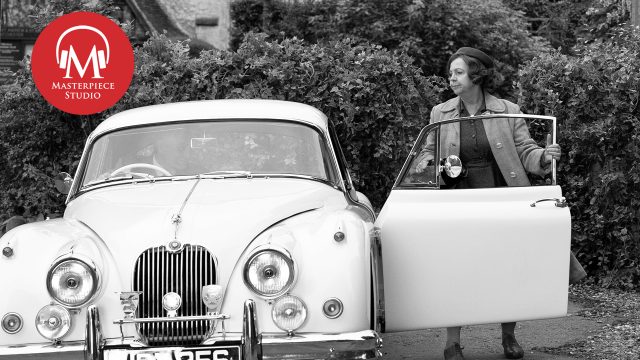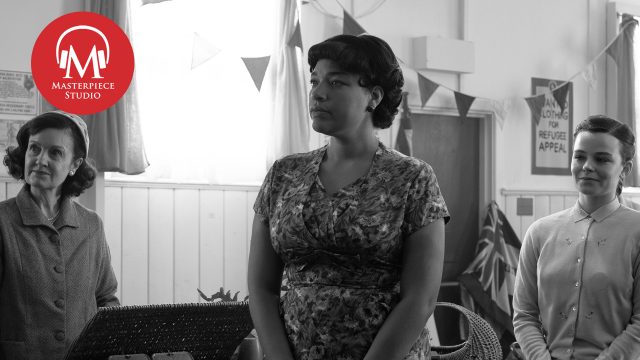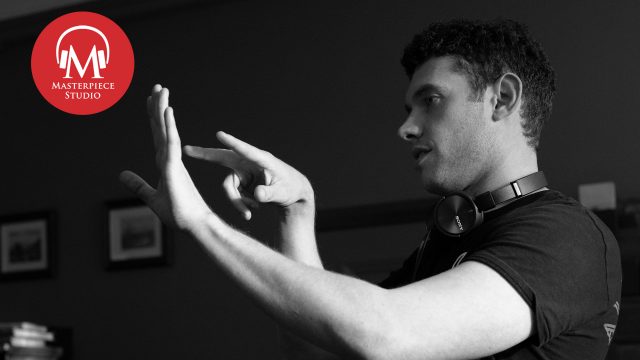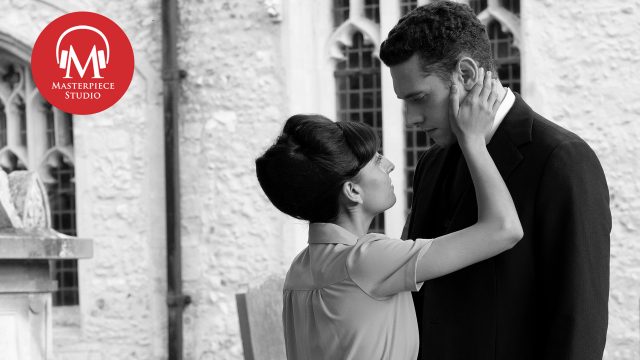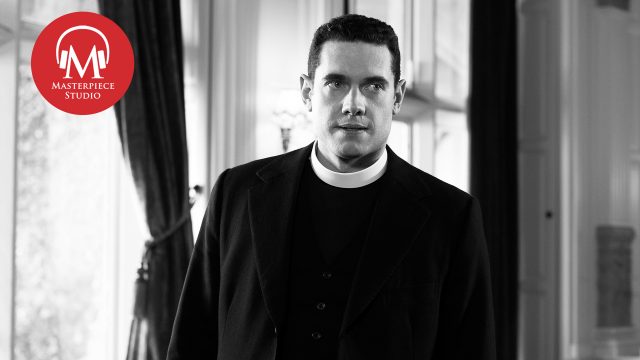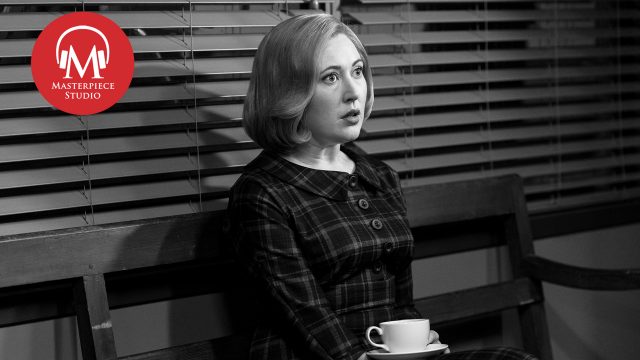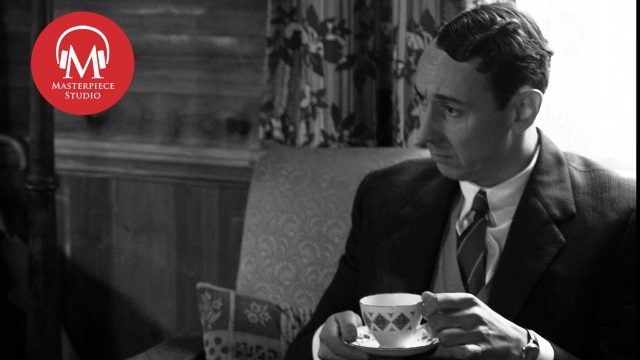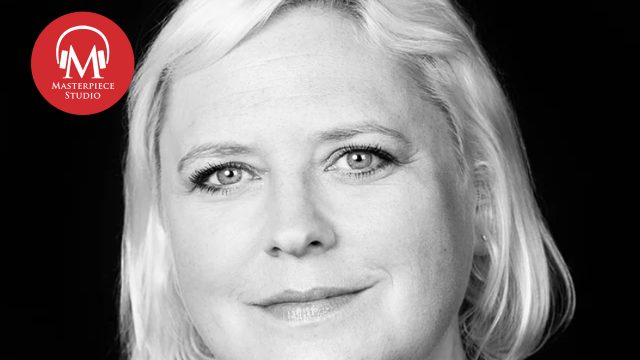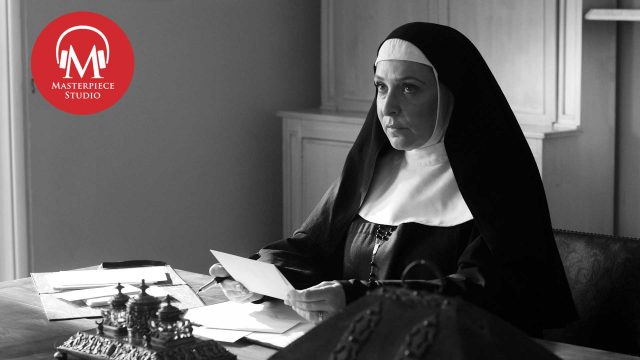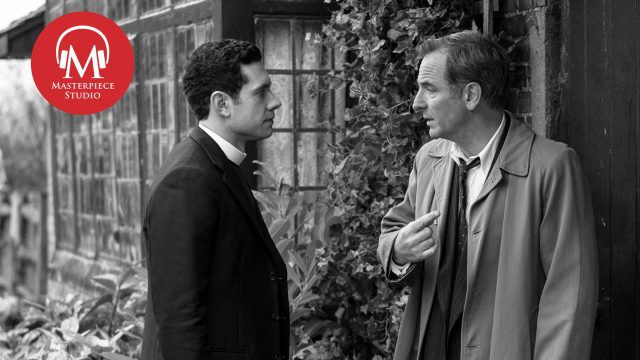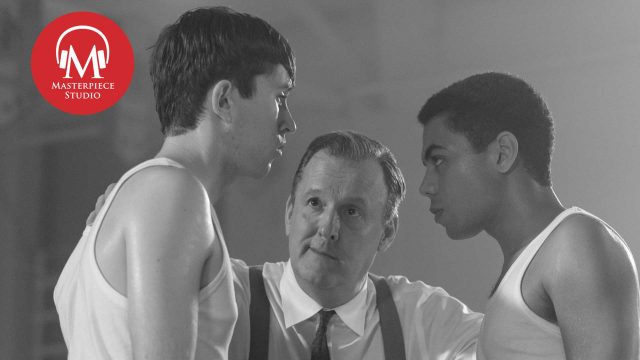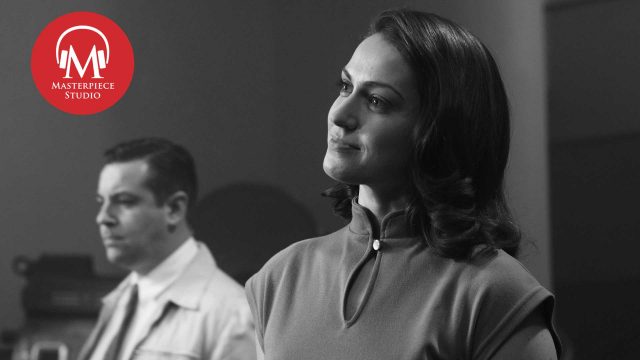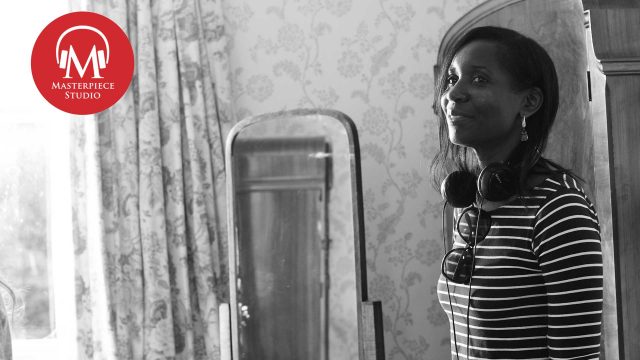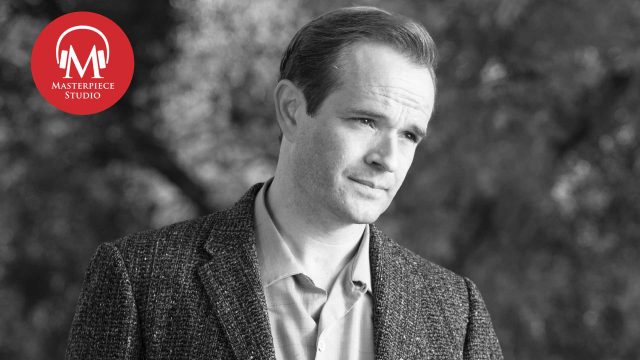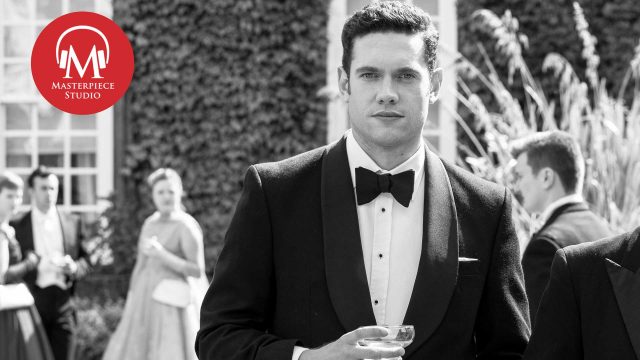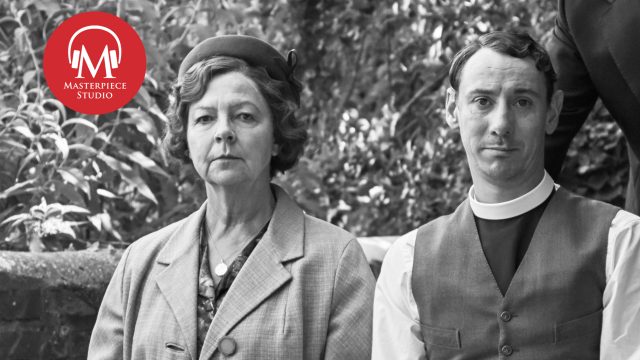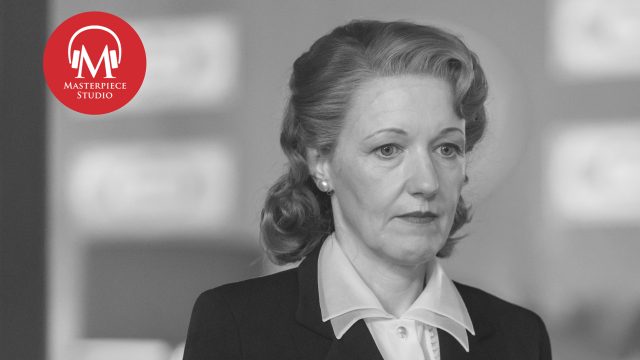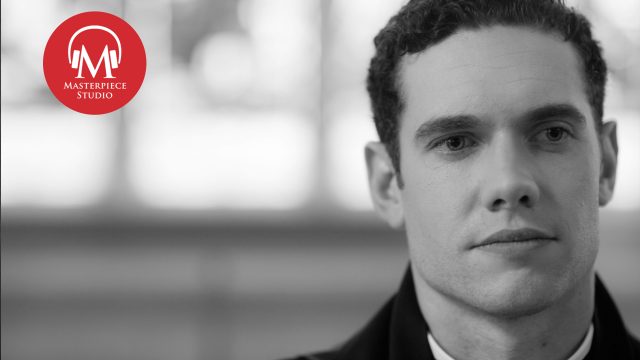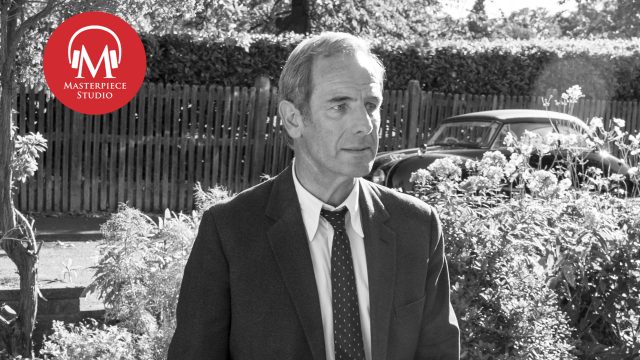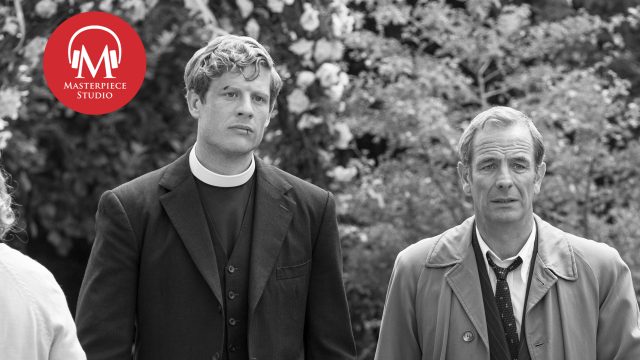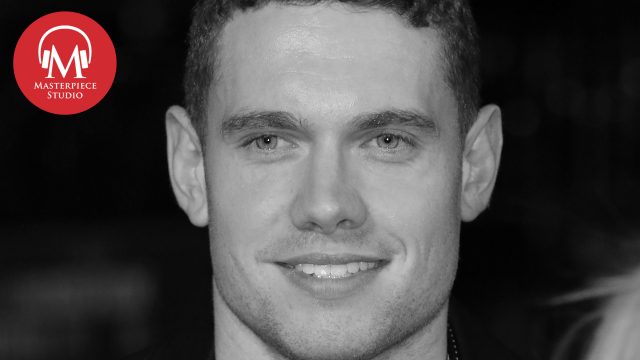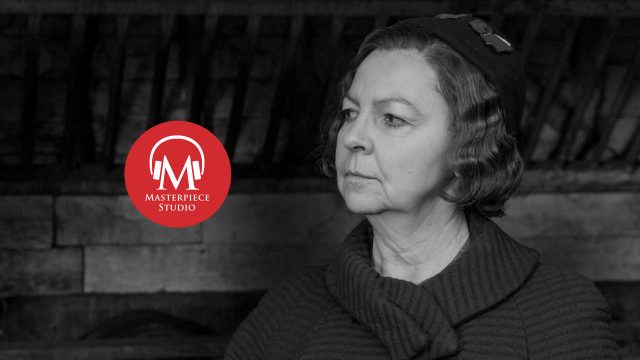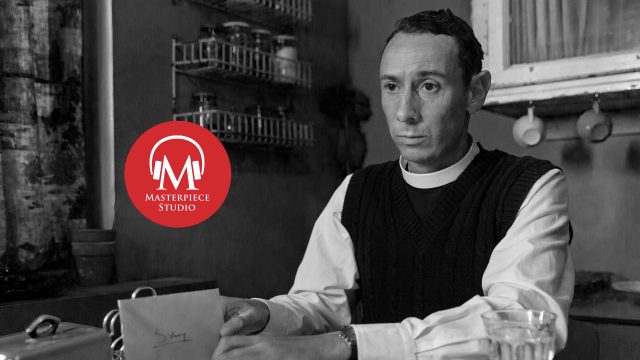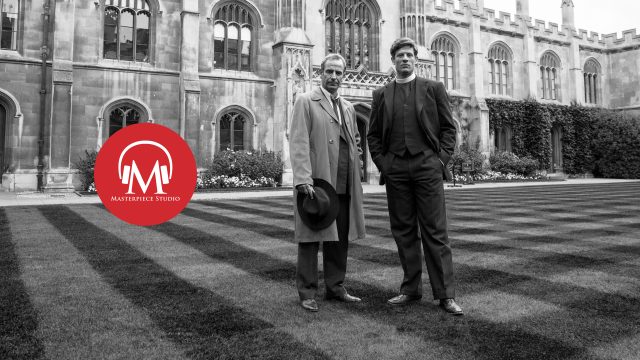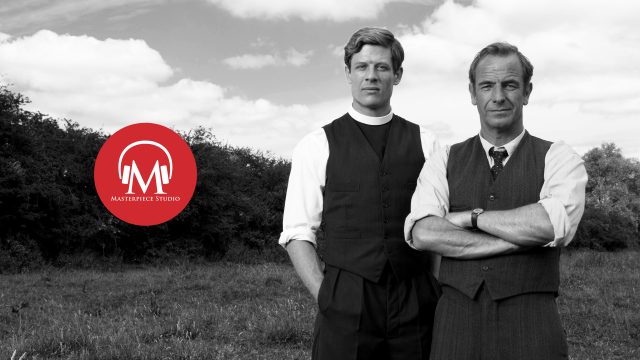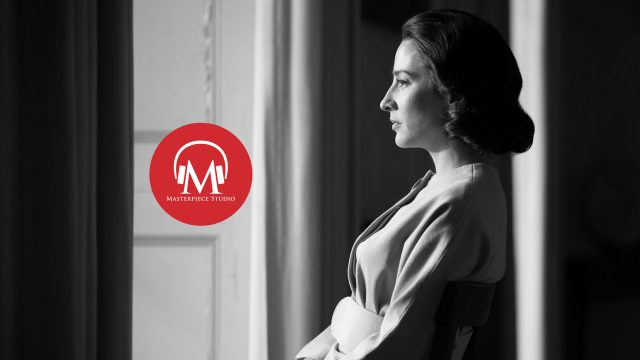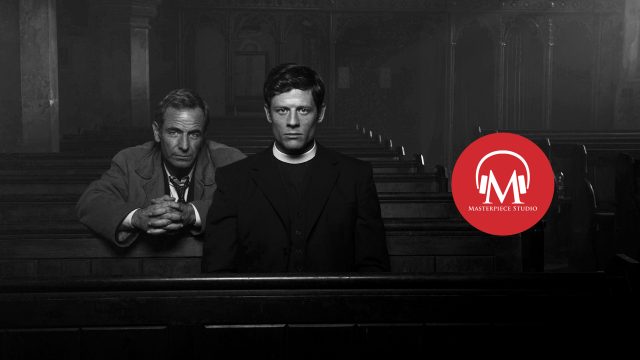Jace Lacob (Jace): MASTERPIECE Studio is brought to you by Audible. For a free trial, go to Audible.com/Masterpiece.
I’m Jace Lacob and you’re listening to MASTERPIECE Studio.
CLIP:
Sidney: Grantchester is hardly the country.
Amanda: Sidney, Grantchester is not Cambridge and Cambridge is most certainly not London.
Jace: The real-life town of Grantchester is similar to the one we see on screen — both are small, idyllic villages located in the English countryside, but there is one key difference between the two…
While the real Grantchester is said to have the highest concentration of Nobel Prize winners, the TV version seems to have the highest concentration of murderers.
And where there’s murder, there’s Grantchester’s crime-solving duo: Anglican vicar Sidney Chambers and police detective Geordie Keating.
CLIP:
Geordie: In another life you’d have been my chief inspector.
Sidney: Right! I don’t know about that.
Geordie: You have a knack for it a lot of the lads don’t have.
Jace: Though the unlikely pair are imagined by “The Grantchester Mysteries” author, James Runcie, Runcie does draw inspiration from his everyday life growing up in the English countryside, where his father was a village vicar.
This week, we’re exploring the rich world of Grantchester, and its memorable characters, with the man who brought it to life, James Runcie.
Jace: Welcome.
James: Thank you so much.
Jace: For those listening who may not be aware, your father was Robert Runcie, the Archbishop of Canterbury. But before that, he was a member of the Scots Guard in World War II and served as a village vicar. How much of an inspiration was your father when you set to create the character of Sidney Chambers?
James: That is, of course, the key question. He’s a very big influence. Sidney Chambers is not my dad, but it would be impossible to conceive of Sidney Chambers without thinking about my dad. This is a complicated area.
I think that I was always attracted to the idea of a compassionate, moral person who had seen war and lived in the 1950s. So that was… A good man in a naughty world I suppose is the starting point, and it does start from my dad. But then there’s a bit of…well quite a lot of me in it, I hope, and other people I’ve met. So it’s a melange of different people, but it would be impossible to conceive of him without thinking about my father.
Jace: What do you think your father would have made of Sidney Chambers or indeed of Grantchester itself?
James: I think he would have been very amused by it. He would have thought that some of it was completely preposterous, but I think he would have been touched by the influence that he has had on me.
Because this is crime fiction, we’re never very far away from talking about death. He died in the year 2000. It is a sort of way of bringing him back and still communicating with him. It’s a kind of fictional, imaginative recreation in a way.
Jace: Now it seems as though the village of Grantchester represents a microcosm of societal change that’s undergoing within Britain as a whole at this time. Is that way you chose to set the Sidney Chambers mysteries in Grantchester precisely? Is that how we should read the village?
James: Yes. It’s an iconic village. It stands for England. It is a small community, but it is also England. It’s a metaphor for England.
Jace: It’s tranquil, but also “a nest of perfidious vipers,” as Mrs. Maguire says.
James: She exaggerates of course.
That’s the only real name, a proper real name. My father had a secretary called Mrs. Maguire. That’s the only real, real name in it. But yes, it’s the idea that there is…even in the most idyllic situation there can be things that are not pleasant.
Jace: Now the first novel in the Grantchester Mysteries is of course entitled Sidney Chambers and the Shadow of Death. How does the shadow of death loss shape Sidney as a character?
James: Yes well the theory is there’s both an individual crime, but also it’s very much an echo of the Second World War, how a society recovers from war.
I’m not so interested in the mechanics in the mechanics of plot, the actual how it happened — because someone missed a train, that must make them responsible for the murder. I’m more interested in the effect of murder on people and on a community, and that’s what I’ve been trying to do.
Jace: In the first novel, Jimmy Johnson tells Sidney, “It would be quite funny if you found out you were better at being a detective than you were at being a priest.” Sidney immediately experiences a wave of insecurity. How does that insecurity and his very innate imperfections help to define him as a character?
James: I think that what’s interesting is that … I hope what’s interesting is that people aren’t always as good at the thing they think they’re good at. We often take what we’re good at for granted and think that we’d be much better doing something else. “If only we were really a baseball star. If only we were really a novelist… ” Sidney sort of thinks he should try about being a detective and he turns out to be sort of quite good at it.
This of course is the age before forensics. I think I’d get into trouble if I was into … This will have to stop before forensics because he has to rely on intuition much more. It has to be past.
He’s not necessarily better about being a detective, but it sort of hits a nerve because, of course, one of the key things about Sidney is I think that he’s easily bored. He’s easily bored by routine and he likes adventure and drama. There’s nothing more dramatic of course than crime.
CLIP:
Mrs. Morton: Do you know he kept a private diary? That would tell us who he met that day.
Sidney: Mrs. Morton –
Mrs. Morton: We have to find the truth!
Sidney: I have neglected my duties long enough.
Mrs. Morton: You didn’t give a damn about your duties yesterday. Your eyes positively lit up. Some intrigue to liven up your humdrum little life.
Jace: Now you once said of James Norton, who plays Sidney Chambers, “It is beyond weird seeing someone loosely based on your father who looks a bit like your nephew playing a loose version of your dad while being younger than you are.”
James: Yes.
Jace: How odd is that experience and what do you make of James’ portrayal of Sidney?
James: Yes. It was a very complicated thing because they do let me on the set, which is very nice of them. They look at me in a sort of bemused way as though I’m this distant relative that they can’t quite remember.
James is a lovely, clever, good person. He is more than good looking. I mean I did want this vicar to have some kind of basic appeal because in the media vicars have been portrayed as these massive figures of fun with false teeth or silly voices, so I wanted somebody sexy and vicar-ous, really. James does that.
Seeing him as a priest was pretty normal because I thought, “That’s an actor being a priest.” What was weird was when he was in these World War II flashbacks dressed as a Scots Guardsman looking like photographs of my father. That was really weird. Then cycling down King’s Parade, the main street in Cambridge, which bizarrely is where I was brought up…So seeing this bloke younger than me, cycling past where I was born, sort of being a version of both my father and me was of course extremely weird; certainly worthy of 4 hours’ therapy I would have thought.
Jace: You mentioned the portrayal of priests in popular media. Often in television, priests are reduced to being, for want of a better term, comedy clerics-
James: Yes or two scenes. They get one scene for the funeral of the main character.
Jace: Exactly. Sidney is a very clear departure from that archetype. Does your work subvert the notion of what it means to be a vicar?
James: Certainly it subverts popular expectation. I hope that– Certainly a retired clergyman, who were clergy in the 50s, are very affectionate about the books. They think the television series pushes it a bit far because, of course, some of the behavior in the television series, and in the second series certainly, he would find it hard to hold onto his job as a priest. He’d probably be sacked. They find that a bit odd, but they do find it very refreshing to have what I hope is an authentic portrayal of what it was really like to be a priest, albeit in a dramatized way. Not every priest has a murder every week to deal with. But…
He’s flawed of course. And I put in…The whisky drinking is because it’s always assumed that English vicars drink sherry and tea.
CLIP:
Staunt: Sherry?
Sidney: Whiskey? Perhaps.
Staunt: I had you down as a sherry man.
Sidney: Most people do.
James: They have tea until 7:00 and then they have sherry, or they have sherry after church on a Sunday. And I wanted to get away from stereotypes by giving him some characteristics: whiskey, and jazz, and a love of cricket, something I’m afraid I’m not going to be able to explain to you as one of the most brilliant games ever invented, but you’re in America so I can’t even start…
He has all these flaws and yet the flaws somehow inform his understanding of other people’s flaws. He is a man of contradiction. He’s very much a man of faith though. His faith is absolutely central and crucial to his entire being. And the idea is that he will always try to hate the sin, but love the sinner.
CLIP:
Sidney: Why would you presume that I’m innocent?
Archdeacon: The girl was a liar.
Sidney: Shouldn’t we wonder why? Shouldn’t we ask why she lied?
Archdeacon: I suggest your time would be best spent praying for her family.
James: He will always try to be compassionate. That aim for compassion, to be a good man in a bad world, is the driving force behind the entire drama and all the contradictions that then involves.
Jace: At the heart of Grantchester is the partnership between Sidney and Geordie and their quote “2-pint problems.”
James: Yes.
Jace: Sidney says of his friend, “We’re talking about wine, and crime, and love. Sometimes I think there is nothing we cannot say to each other.” Why do you think that these two balance each other out so well?
James: The first big thing is that Geordie is absolutely fixed on practical solutions, absolutely, “What can I do practically to make society better?” Whereas Sidney’s interested to do with issues of morality and “How can I heal people?”
That’s the contrast.
I wanted to make a thing about male friendship that was intimate and that…the idea that two men can go to the pub and talk about things that they can’t talk about at home.
This may not be a full answer to your question, but I’m interested in the way truths are revealed. I wanted to explore that idea of gaps in the knowledge, gaps in the knowledge of a situation. Even though Sidney and Geordie do feel they tell each other everything, they of course don’t.
Jace: Especially in the first book, which was mirrored in the first season of Grantchester, Sidney finds himself caught between his affection for Amanda Kendall and for German widow, Hildegard Staunton.
CLIP:
Amanda: Plays the piano? Next you’ll be telling me she actually likes jazz.
Sidney: She does.
Amanda: She lets you think she does! You’re a dark horse, Chambers.
Jace: What do you see as each of these women representing for Sidney?
James: I think that Amanda is traditional, English beauty, and society, and posh, and aristocracy, and everything that somebody educated, intelligent and good looking should aim for.
What Hildegard offers…It was really important to me that the German woman in this offers…complicates the whole issue of a post-war reconstruction and when I was growing up, I still would go to parties where people wouldn’t speak to Germans and people wouldn’t allow Germans to come to parties. It was a kind of extraordinary thing.
But what Hildegard offers is German practicality. She offers music which… My mother was a pianist, and Hildegard is a pianist, so this is a little bit of my mother coming in here. And offers a forthright sense of classless friendship. I think that is … She’s everything Amanda is not.
Jace: Now, I love the rapport between Sidney and Amanda, particularly at a time when an unattached man and a woman couldn’t just be friends. Where did the idea for Amanda come from?
James: I have friends who are like Amanda and in fact Amanda is named after two friends of mine and they both work for the BBC. I took the first name of one and the second name of the other. And they were a little bit worried to begin with because they were worried I would be a bit too jokey about them, but now they love her.
It’s my way of being a little bit self-indulgent, but the crucial thing about it, and the crucial thing about Amanda, is that she allows a bit of wit and that she allows comedy to come into crime. I do think… It’s very important there’s humor in all of this. It’s very important there’s comedy to lighten all that crime. And the Amanda friendship particularly allows for banter, which is a crucial thing.
CLIP:
Sidney: I don’t know where Geordie finds these women – they’re either drunks or nuns.
Amanda: Imagine what they’re saying about you!
James: And that actually allows you to become darker. Once you’ve had a comic moment, you can be darker afterwards. It opens up the writing to be much more filled with contrast. And she opens out the drama in so many different ways to give it richness so we’re not just stuck in what one might call “Midsomer Murders” territory.
Jace: In both the novel and Grantchester, Sidney is joined in his work by curate Leonard Finch. What were your intentions with the character of Leonard and what does he bring to the village of Grantchester?
James: It’s very important to me that Leonard is gay. It’s not obviously apparent that he’s gay, and maybe he doesn’t quite know he’s gay to begin with. He hasn’t discovered that he’s gay. Through these six books, Leonard will gradually come out more and more. And it was important for me to tell that story. But he’s more than a vehicle; he is a counterfold to Sidney. In many ways, he’s a better priest than Sidney is. He’s not good to begin with because he’s scared of people.
CLIP:
Leonard: I know people think I’m ridiculous.
Sidney: No one thinks you’re ridiculous.
Leonard: Oh, they do. I don’t mind, really. I know how it feels when the black dog comes calling, and I’m not talking about Dickens. What I’m trying to say, very badly, as it happens… I’m always here if you need someone to listen.
Sidney: You’re going to make an excellent priest, Leonard.
James: I hope he gives a sort of humanity. They’re a foil to each other really because Sidney is better with people, but less good on the theology. Leonard is very good on the theology, but uncertain of people and uncertain of his sexuality, but I love him.
I particularly … This is the one element of the television series that has really influenced me, which is the performance of Al Weaver — the actor Al Weaver — as Leonard Finch. I think he’s so wonderful that I’ve written far more scenes about him than I originally intended I would.
Jace: Oh I love that.
Now, turning our attention from the human to the canine, are you surprised at all by the outpouring of love for the best Labrador companion ever, Dickens?
James: I think the idea that you can talk to your dog and tell your dog things that you can’t tell other people…It’s another outpouring of secrecy because a lot of this series is about who you tell and when you tell. You can tell your dog anything and he’s unlikely to be able to tell anybody else what you’ve told him. It’s lovely. It’s absolutely lovely to write about a Labrador: happy, no long term memory, always forgiving, better priest than you’ll ever be. Labradors should be vicars really.
Jace: Now what are the influences on your writing, either stylistically or thematically, that you keep coming back to?
James: I’d like to write a sentence like Marilynne Robinson. I’d like to write a novel like Hilary Mantel. I’d like to write a scene or a drama like Chekhov. I’d like to have the pain of Dostoyevsky and the wisdom of Tolstoy. That’s my immediate reaction to your thing. These are all massively ambitious things, but as a writer, I think you have to be in the company of great writers in order to just try and be the best you can be. It doesn’t mean you can be them, of course you can’t be them.
But you have to find your own voice and often it takes a while to find your own voice, but I think I’m doing that now and working really hard at it. Sometimes you have to be on your own to do that.
Jace: You had a plan for doing six books in the Grantchester Mystery Series. The fifth, Sindey Chambers and The Dangers of Temptation is due out in June. Do you see the sixth book as being the end for Sidney and Geordie or can readers hope that you might continue their stories?
James: The sixth book will be an end to the chronological narrative I think. But I will tell you it is not the death of Sidney. It will be open to further things, but those are the things… They’ll always be… Once you’ve got a cast of characters you love, and you want to spend time with them, they become this alternative family. My own family would argue perhaps I spend more time with this made up family than I do with my own, but I’m trying to rectify that.
Jace: What message do you hope that readers or viewers take away from the life of Sidney Chambers?
James: I hope people will be entertained. I hope they’ll be encouraged to live a more literary life, to be more compassionate, to be more humane, to be more understanding, to be more forgiving and to love the people that are closest to them both geographically and spiritually.
Jace: James Runcie, thank you so much.
James: Thank you so much. It’s lovely to talk to you.
Jace: And you. Thank you.
Jace: Don’t miss the next episode of Grantchester, coming to MASTERPIECE on Sunday, April 3rd at 9 pm ET.
And then on April 18th, join us here on MASTERPIECE Studio to hear from actor Morven Christie, who plays Amanda Hopkins.
CLIP:
Morven: In the first book, the story with Guy is one chapter, and then she ditches the guy. She’s like, “See ya.” But, obviously, dramatically in the story, this was something really fascinating for Daisy to explore.
Jace: For more behind-the-scenes content, you can check out the podcast at pbs.org/masterpiece on Stitcher and on iTunes.
And to learn more about the authors and books that inspire MASTERPIECE shows visit pbs.org/masterpiecebookclub.
MASTERPIECE Studio is hosted by me, Jace Lacob. Kathy Tu is our editor. Rachel Aronoff is our production coordinator. Special thanks to Nathan Tobey and Barrett Brountas. The executive producer of MASTERPIECE is Rebecca Eaton.
MASTERPIECE Studio is brought to you by Audible.
Sponsors for MASTERPIECE on PBS are Viking River Cruises, Audible, and The MASTERPIECE Trust.








